10. The Momentum Swing/Momentum Reversal
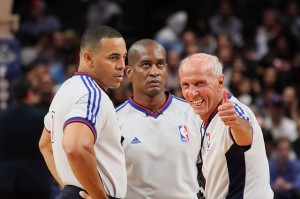
Image courtesy of Michael E. Lee/Flickr.
This is really just a subset of all the other kinds of calls on this list, but it is one that is worth singling out. The Momentum Swing/Reversal occurs when the official gets caught up in the flow and pace of the game and starts making calls based upon… well… momentum.
This can be a tricky one to identify as it can go either way (giggity) by either being a call that goes for or against the team with all the momentum. Usually, though the Momentum Swing comes during a run as an attempt to make the game closer.
So, if a team is down by 25 and on a legitimate 10-0 run, sinking everything, you can expect that if there is even mild contact at the hoop and the shot is missed, the ref will call the foul because that team has all the momentum and is likely playing the better, more aggressive brand of basketball.
Conversely, if the game is tied and a team goes on a 15-0 run where the other guys look lost, you can expect a ticky-tack call, or a random travel violation as an attempt to halt the runaway momentum and give the other team a chance to get back in it.
And if you are up by more than 20 in the fourth quarter you may as well never expect to get another call again.
This should not be the job of the officials. They really should have no concept of what the score is or who is playing well when making each call. The score and the dynamics of the game should not affect what is and is not a foul. Unfortunately, it seems that way too often and then announcers explain, “the calls go to the more aggressive team!”
The calls should go to the team(s)/player(s) who deserve them and nothing more.
9. The Quick T of the Guilty
Adding insult to insult, the Quick T of the Guilty is when a ref makes a terrible call that illicits an understandably, vociferous reaction from either a player or coach and then that same ref quickly feels the need to establish how in charge he is by calling a technical foul on the person he has already unfairly punished.
Here is one when Kenny Mauer goes on a spree!
This is just super annoying. I get that technical fouls exist for a reason and you can’t let coaches scream in NBA referees’ faces all the time, but when you are the one who made the call, another referee should have to call the tech.
If it’s egregious complaining, one of your cohorts will do his job. Otherwise, you are just making a bad situation worse by prioritizing yourself as the authority over the fairness of the game, which is the only point in having officials to begin with.
And for the record, coaches can’t show up NBA referees because NBA referees are not a part of the show. Have enough pride to know that and not laud your power over those you have already done a disservice to. Especially not so aggressively for the TV cameras.
Which brings me to my next point.
8. The Emphatic Surprise
This could have just been overly emphatic calls in general, but sometimes they don’t really bother me. With so much speed and passion flying around, I imagine it’s hard not to get caught up in it all.
So I limited this to the show-me-up Emphatic Surprise call. Unlike referees – who no one came to see referee well and are therefore not a part of the show – players and coaches are the show and shouldn’t be shown up.
Joey Crawford is perhaps the most famous referee for pulling this particular maneuver, but he is not alone and for some reason, the mildly sexual, thrusting nature of the block call seems to bring it out in these guys more than any other call.
Those of you who have seen this can picture it clearly in your head. A player comes charging down one side of the court at a pivotal moment, crashing into another with great force, giving reason to believe he may be whistled for being over-aggressive but it was close and all eyes fall to the referee; and they know it.

Especially when they know most people (or at least the home crowd) think the call is going to be called a charge, the refs run into view, making sure everyone can see how awesome they are and violently thrust their arms backwards almost as if to say, “My pelvic motion is in charge, here!”
I hate this one because it can even sometimes feel like it influenced the call itself. It’s a kind of arrogance that suggests they know better than everyone else and like surprising others in a way that draws attention to themselves… none of which should be the purview of an NBA official.
No one came to the game to watch you officiate. You are not a part of the show if you are doing your job right.

A stare-down too, Tony Brothers? Seriously?
7. The Subjective Charge/Block Call
I’ll concede that the block/charge is one of the most difficult calls in sports to make if the NBA concedes that it doesn’t have to be that way.
Somehow, we have come to a place where this is a 50/50 call, which allows for the common theme of futility in this article – subjectivity.
So now, guys like Shane Battier get the benefit of the doubt when sliding underneath guys because the notion of being “set” has become very gray. As long as your feet are down outside of the circle and your body is mostly squared, you might get a charge call, especially if the offensive player is coming in fast.
The problem is, historically speaking and according to the rule book, the offensive player has the right-of-way to any spot not already occupied by a defender. The defenders body should be square, feet planted, and not moving at all in a spot he has been in, not a spot he is going to.
This needs to go back to being a 90/10 call. If the defender leaps into a position and plants his feet, but his momentum is such that his body is not stable, he didn’t get there in time and it’s a block. If his toes are planted, but he didn’t quite get his heels down or lifted them to keep them out of the circle, then he is not in position and it is a block.
If your feet are moving side to side and the offensive player puts his shoulder into your chest, knocking you over, it is either a block or a no-call, regardless of how square you were.
It shouldn’t come down to player reputation or even the difficult nature of a “bang-bang” play. Like in baseball, the tie should go to the offensive player and not to the defensive player about fifty percent of the time.
If LeBron James or Kobe Bryant is making that move to the basket, that call is not made. If the Gregg Popovich player is the one driving and the tatted-up guy with a terrible defensive reputation is the one trying to take the block, that call is not made.
Manu Ginobili arrives late, his momentum is still moving forward, and he rises up off of his heels and onto his toes as the impact is made. But, he did beat Carmelo Anthony to the spot, so because this has somehow become a 50/50 subjective call, it goes to the player and/or team with the better reputation.
Don’t believe me?
https://www.youtube.com/watch?v=z6ShBLI1-iU
This is also why I wasn’t surprised when a somewhat notorious play went Carmelo’s way. Remember this?
Contact like that is almost never called a block against Carmelo because he is so strong and it doesn’t knock him off his line. In this case, Melo’s reputation as an offensive player was to his benefit, the officials letting what appeared to be minor contact go even though it did make his shot a more difficult one and in hindsight (and maybe only in hindsight) the Dallas Mavericks wish it had been called.
For a moment, I actually thought Melo might get called for the offensive foul there as his hands and shoulder extended a bit and the defender was clearly pushed backwards. Which is much to the point about all the ambiguity at work here.
On the one hand, I’ve seen that kind of contact go against a bunch of strong players – yes, even LeBron or down-low guys like Dwight Howard or Shaq back in the day – as an offensive foul because they created the more powerful impact and extended arms or shoulders. But on the flip side, if that is a block, Carmelo Anthony would like 1,000 more free-throws from the first half of his career please.
By the book (regardless of what the Mavericks told the referees they wanted before the possession) the no-call was the right call there and that is how it should be most of the time.
The charge should only be called when the defender is practically a statue, if for no other reason than it takes out much of the subjectivity, bias and confusion about the rule. Try to take a charge at your own risk, but you better be sure you get there in time.
This will mean calling less blocks as well. And that is okay. If the contact was egregious, it is a block unless the defender was stoic. Otherwise, it isn’t a block, it isn’t a charge — it’s just some guys playin’ basketball.
6. The Wait-And-See-If-It-Goes-In
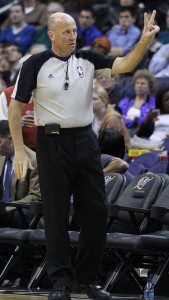
Image courtesy of Keith Allison/Flickr.
There is a distinct sound associated with this one. It’s the sound you make when you don’t realize you are making a sound because you are thinking too hard. In English, we might associate the words “umm” or “uh” with it. In Japanese they would say “eehhhtohhhh…”
But, it is a waiting sound. It is anticipation. With all these big bodies flying around, it can sometimes be difficult to tell how hard they are really smashing into each other. (I swear that was about the NBA and not Game of Thrones). So, sometimes officials will wait and see if the ball goes in the basket, because as we all know, hard contact always makes you miss while light contact never impacts the shot.
This one drives me crazy mostly because of how obvious it is. Most foul calls are made immediately upon impact at, or very near, the moment of the infraction. But when enough time lapses for the basketball to do a “So You Think You Can Dance” routine and then the official realizes that that giant man jumping into that other giant man may have altered the nature of how events would have otherwise unfolded.
This is another one that makes no one happy. I’ve seen numerous instances of the player who was fouled going over to the ref with, “Man, why’d you not call that right away? If it went in I should get the ‘and-one.’ Why wait? Wasn’t it obvious he fouled me?”
I’ve also seen plenty of times when the team called for it late is in an uproar feeling like it was a borderline play that was only called because the ball didn’t go in, which shouldn’t make something a foul.
Sometimes this happens when the official in the best position to make the call doesn’t and there is a delay because the ref who is farther away didn’t see as clearly, but assumes the changed trajectory of the ball implies substantial contact.
In this case, the fouled player often ends up going to the ref who didn’t make the call wondering what’s up and if there is some kind of vendetta going on, while the team called for the foul can insist that the ref who actually blew the whistle wasn’t the one who should be making that call because he is not in optimal position.
There should be a two-second rule in basketball. If you haven’t blown the whistle by then, just let it go and get the next one.
5. The Free Foul for Possession Trade
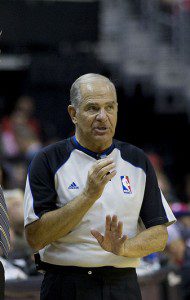
Image courtesy of Keith Allison/Flickr.
We need a better name for this, but anyway… anyone who has watched an NBA game has seen this happen before whether they realized it or not. Inevitably at some point during the game, contact will be made between players of opposing teams that the official may not see or realize the impact of.
When said impact causes said player to lose control of the basketball and it lands out of bounds, the referee blows the whistle, ending the play. And now a decision is made. Was that a foul?
Oftentimes, during more ambiguous contact, the ref will decide that the infraction was perhaps not quite enough to justify calling the foul, but would otherwise clearly be the reason for a loss of possession, so he simply gives the ball back to the team that was technically (if not forcefully) fouled and had the ball to begin with.
It’s a nice sentiment, but it is both not of equal value for the missed call it was traded for, and also now much more confusing with the addition of replay. I have seen this happen several times where the ref failed to call a foul (granting possession instead) only to have replay show that the opposing player hit the arms of the other player and never touched the ball… so how can it be out on him?
The possession has to be reversed because replay clearly shows that the guy who was being fouled (though not getting the call) was definitely the last guy to touch the ball. So now the attempt to equivocate has double-backfired because you can’t go back on replay and assess the foul that should have been called in the first place.
You’ve not only not punished the player for fouling, but have rewarded it by giving his team the possession that his foul caused.
But the Free Foul for Possession Trade’s biggest issue (other than needing a much snappier name) is that it’s mostly a subsidiary of the next entry on our list.
4. The Make-up Call
You know exactly what I’m talking about. A referee makes a bad call and thousands of screaming fans, five large gentlemen and one (usually smaller and older) gentleman wearing a suit, let them know about it.
To their credit, I think most NBA officials know when they have really messed one up. Unfortunately, they seem to have developed a panacea that may work for them, but isn’t doing it for me – the make-up call.
Usually the make-up call occurs on an ensuing possession. The ref wants to make it immediately clear that he is just as capable of screwing the other guys as he is of screwing you. It’s also usually massively inadequate.
If Joakim Noah just picked up his fourth foul and had to come out of the game on a ticky-tack call, you can expect the Chicago Bulls opponent to pick up a silly travel violation or have their point guard called for a “borderline” charge for his first and only foul of that game.
This is insanely frustrating as it attempts to give some semblance of having wiped the slate clean or having brought balance to the force, when your best player is still sitting on the bench, the momentum has swung, the team is rattled and all you got was one stinking possession?
If, on the other hand, the officials do decide to exact an equal revenge (for their own misdoings), things can get even worse.
Imagine a scenario in which Carmelo Anthony is whistled for a couple of borderline calls at home, forcing him to sit and the crowd goes nuts. Then, shortly thereafter, Tim Duncan is given the exact same treatment and is also forced to sit. No one is happy, everyone feels hosed.
The San Antonio Spurs fans, coaches, and players may have all thought the initial call was fair, or at the very least, not their fault and not the reason one of their players should become a target. Gregg Popovich is furious and thinks the ref only made the call because the fans were getting on him.
I saw this exact thing happen in a Denver Nuggets versus Spurs game once. This whole thing evolved into a series of make-up calls because Pop and George Karl were constantly in the officials’ ears about evening the “score” of bad calls since each one seemed to have more (most like unintended) consequences. Here’s one:
In the end, no one went home happy as the Nuggets won a grotesque basketball game, almost blowing it late to the last five guys on the Spurs bench as the starters watched on in horror.
I don’t know how to solve this particular issue and I know there have been times I’ve felt vindicated seeing a bad call go against one team after it just went against their opposition. There is a justice to it. But, it is rarely even-handed or blind justice, so maybe we should just stick to trying to officiate every play exactly as it happens by the rule book.
3. The Superstar Call
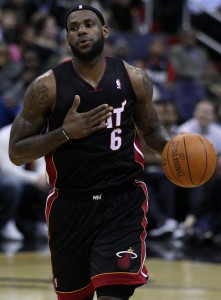
Image courtesy of Keith Allison/Flickr.
I imagine this list will be met (either hopefully in the comments or just in the minds of a few reading) with two main criticisms. Traveling is not on the list, and The Superstar Call is not number one.
The traveling thing can be frustrating but I see it as less of a concern because it seems to be totally random. I’m convinced this happens because keeping track of all those quick moving feet can be difficult, and anyone who thinks traveling is allowed because NBA players can just do whatever they want should count the steps in a college game some time.
One could argue that the realm of star players getting better treatment from the refs is the epitome of the worst elements of the NBA. I mostly don’t buy the line of reasoning that lumps it in with “overpaid primadonnas” or any of that. But, as someone from a small market area, it’s hard to shake the inferiority complex that comes from seeing all the championships and breaks the big cities seem to get.
To my eyes, certain players get the benifit of the doubt because of their reputation and not necessarily their star status. It is still hard to deny that even the perception of the regularity of these kinds of calls can lead many, otherwise great, basketball fans away from the NBA… and into the NCAA where they have super team calls instead.
Kobe Bryant is already amazing, he doesn’t need any help. But, I couldn’t put the the Supersar Call any higher than third because it is only possible via the next two entrants on our list.
2. The “Educated” Guess
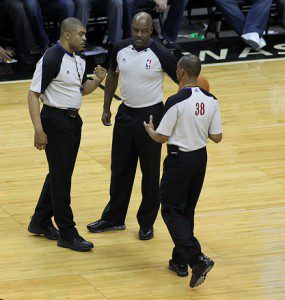
Image courtesy of Keith Allison/Flickr.
Ever wonder where flopping comes from? Anyone who has ever defended a serial flopper (you know who you are) has said the sentence, “it’s being smart.” But smart, unethical, manipulative and bad-for-the-game, are not mutually exclusive concepts.
But the reason that flopping is smart is the same reason taking advantage of tax loopholes is smart; you are taking advantage of a flawed system in order to help yourself at the expense of everyone else. In other words, the NBA allows it through bad officiating.
What is flopping? It is the process by which a grown-ass, professional basketball player – who is among the 250 greatest living athletes in the world (and sometimes right at the top *cough*LeBron*cough*) – flails like a buffoon in an attempt to fool the official into making a bad (read: wrong) call.
Flopping is nothing more than gaming a system to try to gain an unfair advantage. You are attempting to fool the official into calling something they otherwise would not have. And they do it. If officials didn’t get fooled by flopping, players wouldn’t flop.
Instead, it has become so widespread that, now, it is practically a disadvantage if you don’t do it, like steroids in baseball in the 90s, or insider stock trading… or flopping in soccer.
And it is all possible because the NBA is filled with officials making “educated” guesses. They call the action instead of the rule book.
Chris Paul snapped his head back violently and I caught it out of the corner of my eye? Must have been fouled!
Kobe kicks his legs out creating contact and a dangerous play, but I see him fall down shooting a jumper? Well, that’s usually a foul on the other guy. Free throws for Kobe!
Manu Ginobili went flying into the fifth row? Double flagrant! And re-suspend the 2007 Phoenix Suns!
Basketball is a fast game and I know I would fail to make the right call in many of these cases, but the “Educated” Guess is at the heart of everything that is wrong with NBA officiating.
I keep putting quotes around the word “educated” because it implies a gathering of facts and information and everyone who has ever watched more than a handful of NBA games knows that calls based solely on the over-amplified reactions of a player are common. A flailing player is not a thorough education.
We would be better off if the officials never called anything that they didn’t directly see and determine to be an infraction. Some might say we need to add another official because it can be hard to keep an eye on all the action on the court.
But ultimately, you can’t call it if you don’t see it because when you do, all kinds of biases slip in.
We assume LeBron wouldn’t air mail a jump shot, so foul on the other guy.
Kevin Durant is a great guy and wouldn’t complain about something unless it was really missed, so next time, foul on the other guy.
This guy has a great defensive reputation? Probably a foul on the other guy. J.R. Smith is talking trash and being a generally aggravating person? Ignore the foul on the other guy.
Some of this is on us as well. Whatever their biases may be, you are practically expected to put yourself into the middle of the game when you are expecting to make every call.
Almost every possession in an NBA game has two or three minor infractions (a hand-check here, an off-ball shoving match there) and we often expect referees to stay on top of every minute of it. But we shouldn’t. In fact, this, like almost all issues on this list, can be largely solved with one simple direction: blow the whistle less often.
If NBA officials resigned themselves to calling only the most obvious and blatant fouls that they themselves directly saw with a good angle, and let everything else go no matter how bad it looked out of their periphery, things would get missed, but more fairly across the board. Calling fouls shouldn’t be a game of connect the dots.
If adhered to, this would be very close to the “let them play” style of basketball often found in the NBA Playoffs, which brings us to our final entry on the list.
1. The Depends-on-the-Situation Call
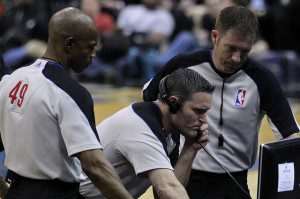
Image courtesy of Keith Allison/Flickr.
And here it is. This is the heart and soul of everything that is wrong with the NBA. In case it hasn’t been clear by the short novel of spewing hate, it has all been covered in a layer of love. I love this game and will defend the NBA to its detractors loudly, stubbornly and even obnoxiously if I have to.
But the concept that some fouls are really fouls at certain times and ignorable at others creates a space that allows for flopping, gaming, equivocating, obfuscating, making-up, momentum swinging, superstar calling (or not calling) mayhem.
It makes commonplace the idea that the rule book is fluid.
The most obvious version of this comes in the distinction between playoff calls and non-playoff calls. The play-by-play guy almost always serves up something like, “In the playoffs, you aren’t going to get that call. It’s a more physical game now.”
This also happens at the end of games where suddenly things that have been fouls this whole time aren’t because now it’s time to just let the players decide the game.
This reminds me of a scene in Aaron Sorkin’s “The West Wing,” when one of the President’s advisors is musing on the changes to the way SAT scores are calculated, quipping, “And I got dumber 20 years after I took the test.”
They change the rules without letting you know and now you’re competing in a different competition than the one you thought you were preparing for the whole time.
Whether it’s thinking you will (or won’t) get a call because that’s how it was during the regular season or even just earlier in that game, the very notion that something can be against the rules at one time and not at another is antithetical to the notion of fairness.
Ever see a player run over to an official screaming about the call and then see on replay it was obvious that he did, in fact, foul? How is this possible? Because sometimes that is allowed and sometimes it isn’t, at the referees’ discretion.
How is it possible that different players, coaches, fan bases, et cetera can all look at the same play in the NBA and disagree on how it should be called? Because sometimes it is, and sometimes it isn’t. Again, referees’ discretion.
And as we have discussed, referees aren’t that discreet.
The NBA always addresses these concerns with the same dialogue. It is the hardest professional sport to officiate, the refs are accountable, and they do a better job than anyone else would. These are are likely true and reminds me that I cannot lay the blame for this entirely at the feet of the zebras.
This could, and should, all be handled by the NBA. Clarify that the block is 90/10, tie goes to the offensive player. Impose a two-second rule. Unequivocally eliminate the make-up call. But most importantly, let ’em play. Just stop blowing the whistle so much.
Some will say that blowing the whistle less often (seriously though, way less often for everybody) could lead to a more dangerous and violent game and endanger the players, causing more injuries. To that I would simple say stop playing this insane 82 game season! But that’s a whole different novel.
Succinctly put, the refs should only be there to make sure things don’t get out of control, they should not be there to be in control.













